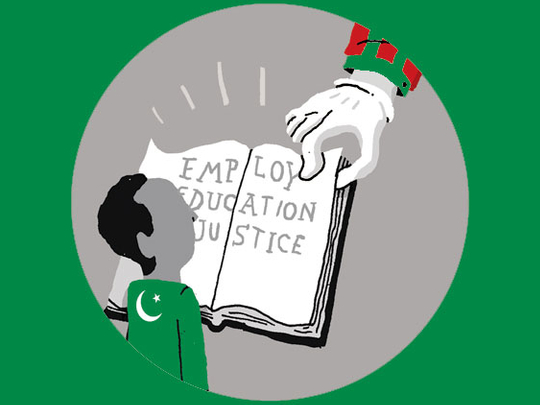
As the US begins to scale back its combat role in Afghanistan, it needs to confront the more important question of Pakistan's future. The US has been a major player there for 60 years — more intensely so since the 9/11 attacks.
If Pakistan is dangerously dysfunctional, Washington helped it get that way. Withdrawal from Afghanistan means that the US will be less dependent on Pakistani supply lines into that country, giving Washington a rare opportunity to dramatically revise US policies and practices in the strategically important nation.
Achieving the US's interests in Pakistan ultimately depends on one thing: the security of Pakistanis. And the key to Pakistanis' security is internal reform. If Pakistanis are more justly governed, more educated, more employed and therefore more able to define and pursue a constructive national identity and interest, they will expunge terrorists to secure themselves.
This will certainly not happen if the US continues to treat Pakistan as an instrument for fighting or spying on territory around Pakistan. For decades that posture has had the undeniable effect of empowering Pakistan's grossly oversized and hyperactive military and intelligence services at the expense of the country's civil society and progress towards effective governance. Washington's collusion with the Pakistani security establishment has amounted to enablement — the indulgence and augmentation of a friend's self-destructive outlook and actions. Strategic change in Pakistan will come only when people who do not share the military's psychology and parochial institutional interests acquire real power.
Policy changes
The following four US policy changes would help. First, Washington must give up the illusion that it can change the Pakistani military's mindset and stop offering it money to do so. Pakistanis, especially in the Inter-Services Intelligence agency, or ISI, see Afghanistan as America's war. And the ISI is obsessed with preventing America's new favourite friend, India, from gaining inroads there.
Neither money nor the threat of its withdrawal will motivate the Pakistani security establishment to fight Pashtuns and other warriors who threaten Afghanistan, India and the US. Rather than demand and offer to pay large sums for Pakistanis to fight people they do not think are their enemies, the US could concentrate support and funding on campaigns to counter extremist violence within Pakistan.
Washington could foster Pakistan's economic development, self-regard and confidence in American intentions by removing barriers to Pakistani textile and apparel exports to the US. Americans often profess that trade is better than aid. But to protect the tiny and unviable remaining textile and apparel sector in the US, Congress blocks efforts to lower tariffs on Pakistani imports of these goods.
By removing these protectionist tariffs, Washington would help spur Pakistan's economic growth without the psychological baggage of aid being perceived as charity.
The US also needs to correct the impression that Pakistani interests and lives mean less than the interests and lives of Indians. This demoralises and often enrages Pakistanis, undermines US credibility and makes it more difficult for progressive Pakistanis to campaign against violent extremist forces in their society. The US would be wiser to join with progressive Indians and Pakistanis in decorously speaking truth to power when India does not correct injustices that undermine regional stability.
Finally, Washington would serve American and Pakistani interests by acknowledging that well-intentioned civilian development and assistance programmes — Congress authorised $7.5 billion for these purposes in 2009 — are not working as intended.
There is enough money, but there are so many restrictions on it, and programme administrators are rotated in and out of Pakistan so frequently, that it makes the British empire look positively sensitive and innovative by comparison.
The US should stop — temporarily — making new project commitments in order to give itself time to work with multinational organisations and Pakistani civil society groups, business leaders and officials with grassroots knowledge to find a way to fund programmes that actually alleviate Pakistan's internal crises.
Pakistan's security establishment will remain an impediment to healing Pakistan's many internal injustices and conflicts. But if Washington makes its support of progressive Pakistanis clearer, there is a chance that Pakistanis can step forward and renew their own country.
George Perkovich is vice-president for studies at the Carnegie Endowment for International Peace and the author of a forthcoming Carnegie publication, Stop Enabling Pakistan's Dangerous Dysfunction.









